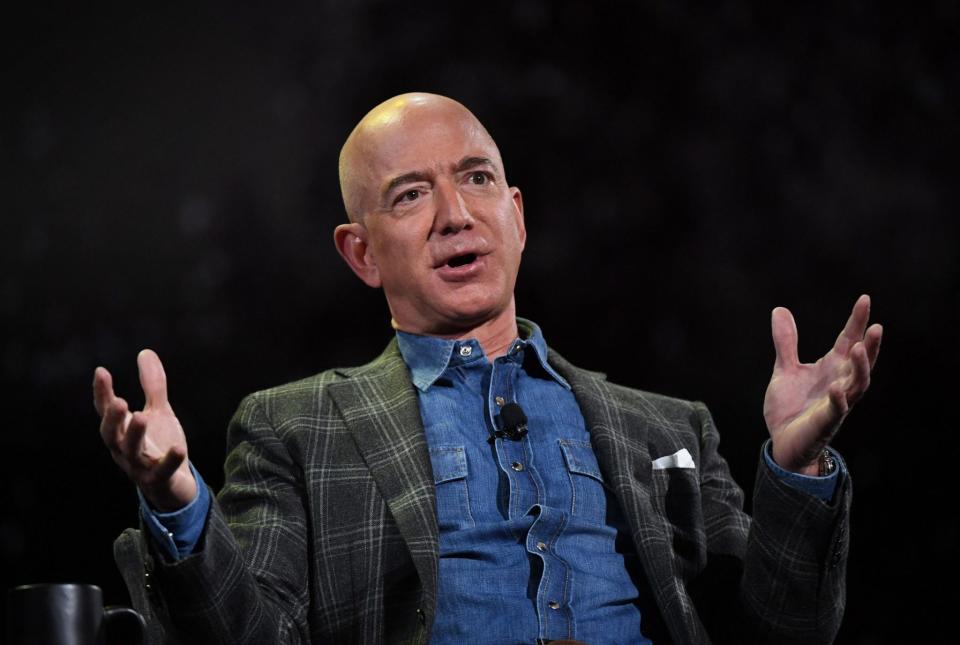Jeff Bezos–backed AI search startup’s CEO says ‘Google is going to be viewed as something that’s legacy and old’

A resurfaced video making the rounds on X shows a pre-famous Jeff Bezos explaining in 1997 why he founded Amazon—namely, a “startling statistic” he came across that web usage was growing at 2,300% a year. Riding that wave by starting an online retailer made sense, he thought.
Now the billionaire is making another bet on the wave of artificial intelligence, in a sector that will directly take on Google. Bezos isn’t the only major tech investor, either.
Founded in August 2022, the startup known as Perplexity aims to challenge Google by offering an AI-based search engine that is “part chatbot and part search engine, offering real-time information and footnotes showing the sources of its answers,” according to its website.
When deciding to invest, Bezos was no doubt looking at the numbers, as he did in the 1990s. Perplexity, while still not profitable, has quickly grown to 10 million monthly active users while almost entirely skipping traditional marketing, according to the company. It further claims that more than a million people have installed its mobile apps on the iOS and Android platforms, and it served over half a billion queries last year.
On Thursday, San Francisco–based Perplexity announced that it has raised $73.6 million from a group of investors led by venture capital firm IVP and including Bezos, the $1.2 trillion AI chip giant Nvidia, and Shopify cofounder Tobias Lütke.
Perplexity is “one of the few consumer AI products to reach this major milestone of 10 million MAUs,” said Jonathan Cohen, VP of Applied Research at Nvidia, in the announcement. AI will “transform how we access information,” he believes.
"Google is going to be viewed as something that's legacy and old,” Perplexity CEO Avarind Srinivas, a former OpenAI researcher, told Reuters this week. “Perplexity will be viewed as something that's the next generation and future.”
$520 million valuation
Perplexity offers a Pro version for $20 per month that allows users to pick from various large language models, among them OpenAI's GPT-4, Anthropic's Claude 2.1, Google's Gemini, or the venture’s own LLM Perplexity.
Perplexity has a long way to go, to be sure. It makes only about $5 million to $10 million in annual revenue from subscriptions and selling its AI software, Srinivas told the Wall Street Journal. It will use the new funding to expand from 38 employees now to about 60 by year’s end.
Despite such meager figures, this week’s funding round values the venture at about $520 million.
Of course, Google parent Alphabet has a market cap of more than $1.7 trillion, and Google dominates online search with roughly 90% market share. It has fended off many challengers and has been a leader in AI since well before OpenAI released ChatGPT in late 2022, kicking off the current AI boom. And it’s testing AI-powered search itself on millions of users.
Meanwhile, Microsoft has incorporated OpenAI’s ChatGPT-4 into its Bing search engine, long a distant second to Google.
Still, while Google faces little immediate danger, it could be hurt in the long run if people start using its search engine less and AI chatbots more as they look for things online.
“If you can directly answer somebody's question, nobody needs those 10 blue links,” Srinivas told the Journal.
He wrote in the announcement this week, “We stand at the inflection point of a massive behavioral shift in how people access information online…The times of sifting through SEO spam, sponsored links, and multiple web pages will be replaced by a much more efficient way to consume and share information.”
His venture is still a long shot, but then, so was Amazon when the web was the wave to ride. Now it’s AI, and Bezos is placing a bet that Perplexity will ride it well.
This story was originally featured on Fortune.com

 Yahoo Finance
Yahoo Finance 